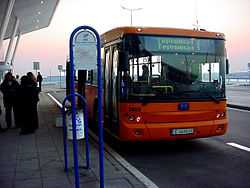Sofia Metro
 | |||
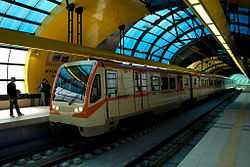 | |||
| Overview | |||
|---|---|---|---|
| Native name |
Софийско метро Sofiysko metro | ||
| Owner | City of Sofia | ||
| Locale | Sofia, Bulgaria | ||
| Transit type | Rapid transit | ||
| Number of lines | 2[1] | ||
| Number of stations | 31[1] | ||
| Daily ridership | 320,000 (2014)[2] | ||
| Chief executive | Stoyan Bratoev | ||
| Headquarters | 121, Knyaz Boris I str. | ||
| Website |
Metropolitan | ||
| Operation | |||
| Began operation | 28 January 1998[1] | ||
| Operator(s) | Metropolitan-Sofia JSC | ||
| Number of vehicles | 52 | ||
| Technical | |||
| System length | 36 km (22.4 mi)[1][3] | ||
| Track gauge | 1,435 mm (4 ft 8 1⁄2 in) standard gauge | ||
| Electrification | Third rail, 825V DC | ||
| Top speed | 80 km/h (50 mph) | ||
| |||
The Sofia Metropolitan (Bulgarian: Софийско метро, translit. Sofiysko metro) is the rapid transit network servicing the Bulgarian capital city Sofia. It began operation on January 28, 1998.[1] As of April 2015, the Sofia Metro consists of two interconnected lines, serving 31 stations, with a total route length of 36 kilometres (22 mi)[1][3] being among the top 30 of the most extensive European metro systems. The Metro links the densely populated districts of Lyulin – Mladost (Line 1 – Red) and Nadezhda – Lozenets (Line 2 – Blue). Also, as of 2 April 2015, Line 1 serves the Sofia Airport.[4][5]
History
Planned since the 1960s, construction of the Metro was not officially launched until the late 1990s mainly because the city did not experience an urgent need for an underground system in addition to the stalled construction due to lack of sufficient funding. Another factor was the depth at which the construction works had to be carried out: being one of the oldest cities in Europe, Sofia contains many historical layers underneath its central areas. Evidence of antiquity can be clearly seen at the Serdika Station which exhibits a wealth of unearthed Thracian and Roman ruins and modern architecture. During the construction of the enormous complex of the National Palace of Culture two stations forming part of the then future Line 2 and their connecting tunnels were built.
The construction of the system began from the route that sees the highest volumes of passenger traffic, that can easily reach up to 38,000 at rush hour.[6]
Lines
Due to the increased number of population, every day from the periphery to the centre and backwards, big passenger flows are being formed. The necessity of efficient public transport in the direction of the largest passenger flows, transport and environmental problems of the city have imposed the start of the construction of the metropolitan in Sofia. Following the ratified by the Council of Ministers of Bulgaria a Technical and economic report on the metro and the approved General City Plan, the General scheme for the development of the lines should consist of three diameters with extensions in the periphery, with total length of 62 km, 63 metro stations, and 1.1 million daily passenger capacity at the final stage of implementation.[7]
| Line | Opened | Current length | Current stations | U/C length | U/C stations | Planned length | Planned stations |
|---|---|---|---|---|---|---|---|
| 1 | 1998 | 25.4 km | 20 | 2.6 km | 3 | 30.9 km | 25 |
| 2 | 2012 | 10.6 km | 11 | 1.3 km | 1 | 17 km | 17 |
| 3 | Planned | – | – | – | – | 16 km | 16 |
| Total: | 36.0 km | 31 | 3.9 km | 4 | 63.9 km | 58 | |
First Line M1 – Red line
The first 6.5 kilometres (4.0 mi) long section of line 1 consisting of five stations linking Slivnitsa Boulevard through Lyulin and K. Velichkov Boulevard was inaugurated on 28 January 1998. Opalchenska station entered into service on 17 September 1999 and Serdika station situated on St Nedelya Square followed on 31 October 2000, extending the total system length to 8.1 kilometres (5.0 mi). The operational section of the line was further extended with a 1.8 kilometres (1.1 mi) long section, reaching Obelya housing estate in April 2003.
The extension of Line 1 continued in 2005 with the start of the construction of 4.8 kilometres (3.0 mi) of tunnels and three stations linking St Nedelya Square and the Interped World Trade Center in Izgrev (station Frédéric Joliot-Curie). 2006 saw the start of the construction of another section of the same line (consisting of 3.2 kilometres (2.0 mi) of tunnels and three stations) linking Izgrev and Mladost I housing estate. The completion of the first three stations was projected for the autumn of 2007, however as a result of various delays it was the second section from the first line (Vasil Levski stadium – Mladost 1) that first entered into service on 8 May 2009, operating for a brief period of time separately from the north-west portion of the line. The remaining section between Serdika and Vasil Levski stadium station finally entered into service on 7 September 2009[8] establishing an interrupted link between Obelya and Mladost 1 stations.
Line 1 branches in two: Northern branch from Mladost I to Sofia Airport (7.2 kilometres (4.5 mi), six stations), and Southern branch from Mladost I to Business Park Sofia (2.62 kilometres (1.63 mi), three underground stations). The construction of the first two stations of the Northern branch began on 15 February 2009 and was completed on 25 April 2012. The construction of Northern branch extension to Sofia Airport for two underground and two overground stations, 4.968 kilometres (3.087 mi) at the cost of BGN 136,757,630 (EUR 69,923,066), VAT exclusive began in 2013,[9][10][11][12] and was completed on 2 April 2015.[4][5] The construction of the Southern branch to Mladost IV and the Sofia Ring road began on 25 April 2013. The stretch is expected to be ready in May 2015.[9] It will cost BGN 85,767,683 (EUR 43,852,320), VAT exclusive, and is going to service the majority of the second most densely populated area in Sofia.[13][14]
| Sofia Metro Line 1 | |||||||||||||||||||||||||||||||||||||||||||||||||||||||||||||||||||||||||||||||||||||||||||||||||||||||||||||||||||||||||||||||||||||||||||||||||||||||||||||||||||||||||||||||||||||||||||||||||||||||||||||||||||||||||||||||||||||||||||||||||||||||||
|---|---|---|---|---|---|---|---|---|---|---|---|---|---|---|---|---|---|---|---|---|---|---|---|---|---|---|---|---|---|---|---|---|---|---|---|---|---|---|---|---|---|---|---|---|---|---|---|---|---|---|---|---|---|---|---|---|---|---|---|---|---|---|---|---|---|---|---|---|---|---|---|---|---|---|---|---|---|---|---|---|---|---|---|---|---|---|---|---|---|---|---|---|---|---|---|---|---|---|---|---|---|---|---|---|---|---|---|---|---|---|---|---|---|---|---|---|---|---|---|---|---|---|---|---|---|---|---|---|---|---|---|---|---|---|---|---|---|---|---|---|---|---|---|---|---|---|---|---|---|---|---|---|---|---|---|---|---|---|---|---|---|---|---|---|---|---|---|---|---|---|---|---|---|---|---|---|---|---|---|---|---|---|---|---|---|---|---|---|---|---|---|---|---|---|---|---|---|---|---|---|---|---|---|---|---|---|---|---|---|---|---|---|---|---|---|---|---|---|---|---|---|---|---|---|---|---|---|---|---|---|---|---|---|---|---|---|---|---|---|---|---|---|---|---|---|---|---|---|---|
Legend | |||||||||||||||||||||||||||||||||||||||||||||||||||||||||||||||||||||||||||||||||||||||||||||||||||||||||||||||||||||||||||||||||||||||||||||||||||||||||||||||||||||||||||||||||||||||||||||||||||||||||||||||||||||||||||||||||||||||||||||||||||||||||
| |||||||||||||||||||||||||||||||||||||||||||||||||||||||||||||||||||||||||||||||||||||||||||||||||||||||||||||||||||||||||||||||||||||||||||||||||||||||||||||||||||||||||||||||||||||||||||||||||||||||||||||||||||||||||||||||||||||||||||||||||||||||||
- Main Line
| Station | Image | In service since | Notes |
|---|---|---|---|
| Obelya (Обеля) |  | 20 April 2003 | Set to be used as a link between the depot and line M2. |
| Slivnitsa (Сливница) | 28 January 1998 | ||
| Lyulin (Люлин) | 28 January 1998 | servicing Lyulin housing estate | |
| Zapaden Park (Западен парк) | 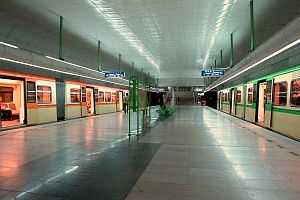 | 28 January 1998 | |
| Vardar (Вардар) | 28 January 1998 | ||
| Konstantin Velichkov (Константин Величков) | 28 January 1998 | ||
| Opalchenska (Опълченска) | 17 September 1999 | ||
| Serdika (Сердика) |  | 31 October 2000 | transfer station between the Red (M1) and Blue (M2) lines |
| St. Kliment Ohridski Sofia University (СУ „Св. Климент Охридски“) | | 7 September 2009 | situated nearby Sofia University |
| Vasil Levski Stadium (Стадион „Васил Левски“) | 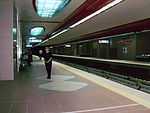 | 8 May 2009 | situated nearby Vasil Levski National Stadium |
| Joliot-Curie (Жолио Кюри) | 8 May 2009 | ||
| G.M.Dimitrov (Г. М. Димитров) | 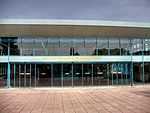 | 8 May 2009 | |
| Musagenitsa (Мусагеница) | | 8 May 2009 | servicing Musagenitsa housing estate |
| Mladost 1 (Младост 1) | | 8 May 2009 | servicing Mladost 1 housing estate |
| Northern branch | |||
| Mladost 3 (Младост 3) | 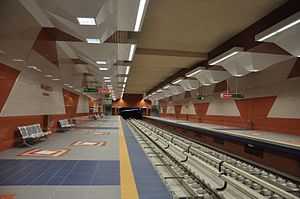 | 25 April 2012 | servicing Mladost 3 housing estate |
| Inter Expo Center - Tsarigradsko Shose (Интер Експо Център - Цариградско шосе) | 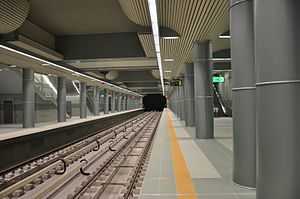 | 25 April 2012 | situated on Tsarigradsko shose |
| Druzhba (Дружба) | 2 April 2015 | servicing Druzhba housing estate | |
| Iskarsko Shose (Искърско шосе) | 2 April 2015 | ||
| Sofiyska Sveta Gora (Софийска Света гора) | 2 April 2015 | ||
| Sofia Airport (Летище София) | 2 April 2015 | situated nearby Sofia Airport with direct connection to Terminal 2 | |
| Southern branch (under construction) | |||
| Aleksandar Malinov (Александър Малинов) | 8 May 2015 | servicing Mladost 2 and Mladost 3 housing estate | |
| Akad. Aleksandar Teodorov-Balan (Акад. Александър Теодоров-Балан) | 8 May 2015 | servicing Mladost 2 and Mladost 3 housing estate | |
| Business Park Sofia (Бизнес Парк София) | 8 May 2015 | situated nearby Business Park Sofia and servicing Mladost 4 housing estate | |
| Sofia Park (София парк) | planned | will be situated nearby residential district Sofia Park (жк. София парк) and Sofia Ring Road[15] | |
| Simeonovo (Симеоново) | planned | will be situated nearby gondola lift Кабинков лифт Симеоново - Алеко and Sofia Ring Road[16] | |
Second Line M2 – Blue Line
| Sofia Metro Line 2 | ||||||||||||||||||||||||||||||||||||||||||||||||||||||||||||||||||||||||||||||||||||||||||||||||||||||||||||||||||||||||||||
|---|---|---|---|---|---|---|---|---|---|---|---|---|---|---|---|---|---|---|---|---|---|---|---|---|---|---|---|---|---|---|---|---|---|---|---|---|---|---|---|---|---|---|---|---|---|---|---|---|---|---|---|---|---|---|---|---|---|---|---|---|---|---|---|---|---|---|---|---|---|---|---|---|---|---|---|---|---|---|---|---|---|---|---|---|---|---|---|---|---|---|---|---|---|---|---|---|---|---|---|---|---|---|---|---|---|---|---|---|---|---|---|---|---|---|---|---|---|---|---|---|---|---|---|---|
Legend | ||||||||||||||||||||||||||||||||||||||||||||||||||||||||||||||||||||||||||||||||||||||||||||||||||||||||||||||||||||||||||||
| ||||||||||||||||||||||||||||||||||||||||||||||||||||||||||||||||||||||||||||||||||||||||||||||||||||||||||||||||||||||||||||
The second line of the Sofia Metro links the districts of Obelya, Nadezhda, the city centre and Lozenets to the south of the city.[17] Half of the construction cost was covered by the European Union, with the remaining part funded by the state and city budgets.[17] Construction of the 6.4 km section between Nadezhda interchange and Lozenets district via Central railway station and the National Palace of Culture started on 14 December 2008. Work on the section between Obelya residential District and Nadezhda started in February 2010. Both sections of the line entered into service on 31 August 2012.[17]
NDK and European Union stations and their connecting tunnels were partly completed during the construction of the National Palace of Culture and the redevelopment of the surrounding area in the late 1970s and early 1980s.
In March 2014, a contract for a south extension of the line was signed. The extension is 1.3 km long includes Vitosha Metro Station, located at the Hladilnika neighbourhood. The construction works are expected to be completed in 22 months from the construction permit,[18] and is scheduled to open in June 2016.[9]
Provisions have been made for the construction of future branch to Iliyantsi, starting from the existing junction located between Knyaginya Maria Luiza and Han Kubrat stations.
Main Line
| Station | Image | In service since | Notes |
|---|---|---|---|
| Obelya (Обеля) |  | 20 April 2003 | Set to be used as a link between the depot and line M2. |
| Lomsko shose (Ломско шосе) | 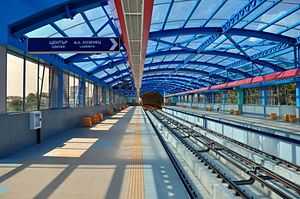 | 31 August 2012 | servicing Vrabnitsa housing estate |
| Beli Dunav (Бели Дунав) |  | 31 August 2012 | situated on the border between Nadezhda 3 and Nadezhda 4 housing estates |
| Nadezhda (Надежда) | 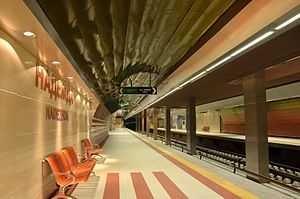 | 31 August 2012 | servicing Nadezhda housing estate and situated on Lomsko shose boulevard |
| Han Kubrat (Хан Кубрат) | 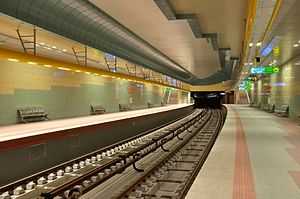 | 31 August 2012 | situated on the border between Nadezhda 1 and Nadezhda 2 housing estates |
| Knyaginya Maria Luiza (Княгиня Мария Луиза) | 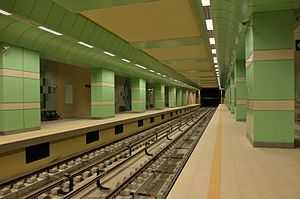 | 31 August 2012 | situated nearby Klementinska hospital |
| Central Railway Station (Централна ж.п. гара) | 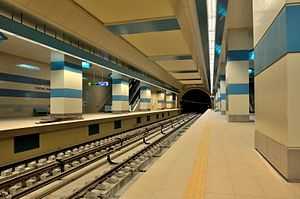 | 31 August 2012 | situated nearby Sofia Central Station and Central Bus Station Sofia |
| Lavov Most (Лъвов мост) | 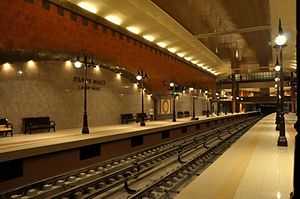 | 31 August 2012 | situated nearby Lavov Most |
| Serdika II (Сердика II) |  | 31 August 2012 | transfer station between the Red (M1) and Blue (M2) lines |
| NDK (НДК ) |  | 31 August 2012 | situated to the north of the National Palace of Culture |
| European Union (Европейски съюз)[19] |  | 31 August 2012 | situated nearby the Earth and Man National Museum and City Center Sofia |
| James Bourchier (Джеймс Баучер) | 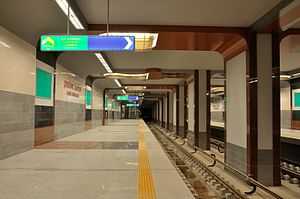 | 31 August 2012 | servicing Lozenets housing estate |
| Vitosha (Витоша) | scheduled for 2016; construction started August 2014 | ||
| Cherni vrah (Черни връх) | planned | ||
| Dragalevtsi (Драгалевци) | planned | ||
- Iliyantsi branch (planned)
- Lev Tolstoy (Лев Толстой)
- Svoboda (Свобода)
- Rozhen (Рожен)
- Iliyantsi (Илиянци)
Third Line M3 – Green Line
The 16 km long third line is planned to connect Ovcha Kupel neighbourhood (in southwest Sofia) and Vasil Levski neighbourhood (in northeast Sofia), with 19 stations in total,[20] including two transfer stations in the city centre, with both of the already operational lines. According to the Municipality, they estimate the line will be put into service by 2018.
There will be 8 overground and 11 underground stations. The project design contract was awarded to the Czech company Metroprojekt Praha a.s.[21][22][23]
In March 2014, a tender for construction of the central section of the line was announced. The section is 7 km long and includes 7 stations, two of them transfer to lines 1 and 2. With the announcement of the tender it became clear, that the initial plans for 19 stations had been partly amended and 2 of the stations will be not be built, one at Doyran boulevard and another at Shipka street. The tunnel of the central section shall be excavated by a TBM, while the construction of stations shall be awarded to other companies. The construction of the section shall be completed within 45 months.[24] In January 2015, a tender for 20 trains, that shall serve the central section of the line, was announced. Driverless train operation, with Grade of Automation 3 (GoA 3), and platform screen doors will ensure the safety of the passengers. Unlike lines 1 and 2, where the trains collect power through a third rail, line 3 trains will be equipped with pantographs.[25][26]
Fares and ticketing
The price of a single ticket is 1 lev, equivalent to ~0.51 euro. It can be issued either by a cashier, or by a vending machine. When obtained, the single ticket must be validated within 30 minutes at a validator. Pre-paid magnetic card also could be bought (at a price of 1 lev) with minimum 10 pre-paid rides (at a price of 8 levs for 10 pre-paid rides). Daily and monthly cards are also available.[27]
Rolling stock
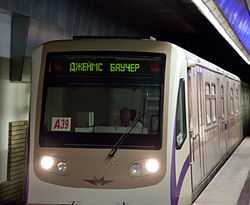
The system uses two types of rolling stock, both made in Russia.
The older train sets, type 81-717/714, have been manufactured by Metrovagonmash in Mytishchi near Moscow and consisted of 48 carriages in total. They were delivered in 1990 – some 8 years prior to the opening of the first section of the system.
The second generation of rolling stock, type 81-740/741 "Rusich", have also been manufactured by Metrovagonmash. The delivery of this type commenced in 2005. With line M2 now in service, 40 more trains of this type were delivered by the end of 2013.[17]
Traffic figures
| Year | Passengers per day | Change | Metro Stations |
|---|---|---|---|
| 1998 | 10,000[28] | Initial 5 | |
| 1999 | 6 | ||
| 2000 | 70,000[28] | 7 | |
| 2001 | 7 | ||
| 2002 | 90,000[29] | 7 | |
| 2003 | 80,000[6] | 8 | |
| 2004 | 8 | ||
| 2005 | 70,000[30] | 8 | |
| 2006 | 8 | ||
| 2007 | 90,000[31] | 8 | |
| 2008 | 76,000[32] | 8 | |
| 2009 | 201,000[33] | 14 | |
| 2010 | 187,000[34] | 14 | |
| 2011 | 190,000[35] | 14 | |
| 2012 | 350,000[36] | 27 | |
| 2013 | 280,000[37] | 27 | |
| 2014 | 320,000[37] | 27 | |
| 2015 (01.01 – ) | 31 |
See also
- Trams in Sofia
- Trolleybuses in Sofia
- Public buses in Sofia
- Sofia Public Transport
- List of metro systems
References
- ↑ 1.0 1.1 1.2 1.3 1.4 1.5 "General Info about Sofia Metro". MetroSofia.com. 2013. Retrieved 2013-09-20.
- ↑ Столичното метро ще се движи на по-чести интервали от април
- ↑ 3.0 3.1 "Председателят на комисията Жозе Мануел Барозу ще пререже лентата на втория лъч на подземната железница" [We want the [European Commission (EC)] 800 million for the third metro line] (in Bulgarian). Строител. July 30, 2012. Retrieved 2013-09-20.
- ↑ 4.0 4.1 "Subway Trains to Sofia Airport Start Running at 1 pm on April 2". novinite.com. 2 April 2015. Retrieved 2015-04-07.
- ↑ 5.0 5.1 "Sofia airport metro link opens". Railway Gazette International. 7 April 2015. Retrieved 2015-04-07.
- ↑ 6.0 6.1 Metropolitan Sofia – General Information
- ↑ Metropolitan Sofia – General Scheme
- ↑ "Sofia Metro links east and west Sofia suburbs". Sofia Echo. 7 September 2009.
- ↑ 9.0 9.1 9.2 Stoyanov, Assen (2 March 2015). "Testing begins on Sofia metro extensions". International Railway Journal. Retrieved 2015-04-01.
- ↑ Public Procurement Agency Portal - L1 N. Branch Construction Positions 1 & 2
- ↑ Public Procurement Agency Portal - L1 N. Branch Construction Position 3
- ↑ Public Procurement Agency Portal - L1 N. Branch Supervision
- ↑ Public Procurement Agency Portal - L1 S. Branch Construction
- ↑ Public Procurement Agency Portal - L1 S. Branch Supervision
- ↑ Спаси метрото
- ↑ Sofia Municipal Expert Spatial Development Council (MESDC)
- ↑ 17.0 17.1 17.2 17.3 "Free rides celebrate opening of Sofia metro Line 2". Railway Gazette International. 31 August 2012.
- ↑
- ↑ http://media.snimka.bg/s1/0817/027878246.jpg
- ↑
- ↑ O.P. Transport: Third Metro Diameter (in Bulgarian) BNT, 29 November 2011. Retrieved 30 Sep 2012.
- ↑ Metroprojekt – History (2011–Future) Metroprojekt.cz – Retrieved 30 September 2012.
- ↑ METRORAIL 2013 Presentation Metroprojekt.cz
- ↑ "ОБЯВЛЕНИЕ ЗА ПОРЪЧКА" (in Bulgarian). metropoliten via AOP.
- ↑ "Кметът на гр. София провери напредъка в изпълнението на участък „Младост 1 – бул. Цариградско шосе”" (in Bulgarian). Metropoliten. Retrieved 31 March 2015.
- ↑ "Третият лъч на метрото зад стъкло срещу инциденти" (in Bulgarian). Trud Newspapers. 14 January 2014.
- ↑ "Information for citizens". Metropolitan. Retrieved 16 October 2014.
- ↑ 28.0 28.1 Стоян Братоев Софийски метрополитен. — София: Нота Бене, 2004. — p. 61 — ISBN 954-91420-1-9
- ↑ Стоян Братоев Софийски метрополитен. — София: Нота Бене, 2004. — p. 14 — ISBN 954-91420-1-9
- ↑ "Метрото ще вози милион пътници". Standart. 18 July 2005.
- ↑ "Паркинги на три етажа в метрото". fakti.bg. 30 March 2007.
- ↑ "Намаляват пътниците в градския транспорт". money.bg. 18 February 2009.
- ↑ "Столичното метро постави рекорд - 201 хиляди пътници за един ден". BNT. 21 December 2009.
- ↑ "Колата измести градския транспорт". monitor.bg. 24 April 2010.
- ↑ "400 хиляди пътници на ден ще пътуват с метро от 2012 година". TV7. 19 June 2011.
- ↑ "Между 15 и 20% от стойността на метрото са за системите за управление". stroitelstvo.info. 3 December 2012.
- ↑ 37.0 37.1 Столичното метро ще се движи на по-чести интервали от април
External links
| Wikimedia Commons has media related to Sofia Metro. |
- Sofia Metro – Official Web Site
- MetroSofia.com (English)
- Sofia metro @ urbanrail.net
- Metrovagonmash OAO – Information about the rolling stock
- Metro @ public-transport.net
- Unofficial Sofia tube map inspired by London's one, designed for foreign visitors
- Sofia Metro – quick info and maps
| ||||||||||||||||||||

